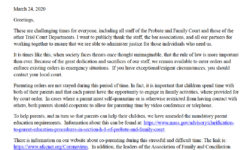Q: I want my spouse to continue paying our mortgage while we are in the process of getting a divorce…how can I be sure my spouse will make these payments?
A: You will need a court order to enforce payments. This is called a Motion for Temporary Orders seeking the specific action you want. This court order will stay in effect until your case is settled, by agreement or trial.
It takes time to get divorced in Massachusetts. First you must file your divorce in the county where you last lived as spouses, if one of you still resides in the marital residence, or if neither of you reside at the marital residence, then in the county where either of you currently reside.
From the date you file your complaint to divorce, to the date your divorce is final may be several months or even years, depending on the complexity of the contested issues.
Therefore, if you need the judge to make an order about something right away, you must file a Motion for Temporary Orders. A Motion for Temporary Orders asks the court to deal with important issues while you wait for the final hearing. If the judge orders a temporary order, it will last until the judge makes a new order or a final decision.
For example, when one divorcing spouse moves out of the house, you have two options: reach an agreement about how you'll share expenses and about child custody and support, or go to court and ask the judge to decide. If an agreement cannot be met, or if you and your spouse do not communicate, seeking a temporary order will be your only option.
To be heard on a request for a temporary order, a motion for temporary order must be filed. You, or your counsel, depending on if you are represented, will file a motion defining what you are seeking. While your spouse can oppose your motion for temporary orders, each spouse, is given the opportunity to make their best argument to the judge as to why the temporary order he/she is requesting is appropriate. At the conclusion of the hearing, the judge will likely make a decision, called a Temporary Order. Your receipt of this court ruling can oftentimes take days or weeks to receive in the mail.
It is not certain that the judge will make a ruling on the date of the motion hearing. Furthermore, if the judge determines that more information is needed or finds that your spouse was not given the proper notice in advance of the hearing, the judge may issue an order that is effective only until another hearing can be held. Disclosure of the Motion you are seeking and proper notice are important technicalities that must be met throughout the divorce process. Following proper procedural rules and providing all necessary information will ensure that the judge has adequate information to formulate a temporary order that is fair and just.






